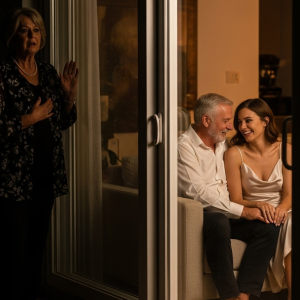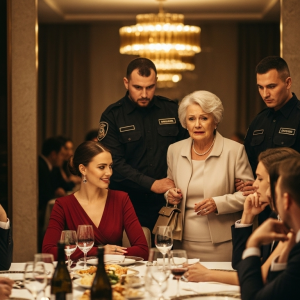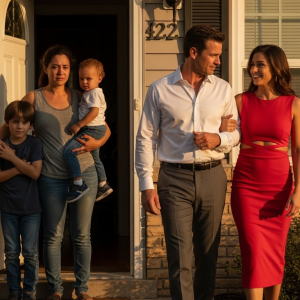My name is Megan Miller. I’m a 32-year-old graphic designer in Chicago. This morning, my phone lit up with 29 missed calls from an unknown number, and in an instant, I was twelve years old again, standing alone at Union Station, watching my parents drive away laughing. “Let’s see how she finds her way home,” my mother had shouted.
They found me. After twenty years, they found me.
Growing up in Ridge View, Pennsylvania, was like living in two different worlds. To outsiders, we were the picture-perfect family. Frank and Karen Taylor, successful small business owners, with their two children: Ethan, the golden boy, and me, Jennifer—the girl who would become Megan.
But behind closed doors, our home was a minefield. My father, Frank, was a respected hardware store owner whose booming laugh in public would curdle into alcohol-fueled anger at home. My mother, Karen, whose apple pies won county fair ribbons, was his most loyal enabler. “Your father works so hard,” she’d say, an excuse for every night he spent drinking and criticizing.
Their parenting philosophy was “tough love,” a term they used to disguise cruelty as discipline. When I was seven, they left me at a grocery store for an hour because I asked for candy. “Maybe now you’ll learn not to be so greedy,” Mom said when they returned to find me sobbing by the customer service desk.
My older brother, Ethan, was the star quarterback, the straight-A student. He could do no wrong. While I was chastised for a 97% on a math test—“What happened to the other 3%?”—Ethan was praised for a B+. I became the family scapegoat.
The day before they left me, my report card became the catalyst. Straight A’s, except for one A-minus.
“An A-minus?” Dad had bellowed, waving the paper. “Are you getting lazy? Ethan never got A-minuses.”
That night, I overheard them in the kitchen. “She’s too soft, too sensitive,” Dad said. “Maybe she needs a real lesson.”
Mom agreed. “Something she won’t forget.”
The next morning, they announced a surprise family trip to Chicago. Just the three of us. For a fleeting, foolish moment, I felt a glimmer of hope. Maybe this was their way of apologizing. I couldn’t have been more wrong.
The drive to Chicago was a masterclass in psychological tension. Dad played classic rock too loudly while Mom quizzed me on state capitals, her tone sweet but her eyes sharp. “Even a third grader would know that one, Jen,” Dad would click his tongue if I hesitated.
We parked near Union Station around noon, the massive building swarming with travelers. “Wait here by this pillar,” Mom instructed, pointing to a column near the entrance. “We’re going to move the car and grab some food. We’ll be back in 15 minutes.”
“Can’t I come with you?” I asked, a familiar anxiety creeping into my voice.
“What, are you a baby?” Dad laughed. “You’re twelve years old, for God’s sake. Stay right here. Don’t move.”
I watched them disappear into the crowd. The station clock read 12:17 PM. Fifteen minutes passed. Then thirty. Then an hour. The simmering anxiety boiled over into full-blown panic. I didn’t have a cell phone. I had exactly $7 in my pocket.
Then, through the large windows, I saw our blue Ford Taurus. My heart leaped. I ran toward the exit, waving frantically. As the car passed, I saw them both inside. Dad was driving. When he saw me, he grinned and gave a small, taunting wave. Mom rolled down her window.
“Let’s see how you find your way home!” she shouted, and their laughter echoed as they accelerated away, leaving me frozen on the sidewalk.
This wasn’t a lesson. They were gone. For two hours, I wandered the station in a daze, my panic a physical weight in my chest. Around 3:30 PM, a station employee named Janet, an older woman with kind eyes, knelt down to my level. “Honey, are you lost?”
The question broke me. The carefully constructed dam of my composure shattered, and three hours of terror and confusion came pouring out in a flood of tears. “They left me,” I sobbed. “They drove away and said to find my way home… but home is in Pennsylvania.”
Janet’s face shifted from concern to alarm. She led me to a quiet office, and soon a security officer named Marcus was asking me questions. “We need to call the police,” he said, his expression grim. “What your parents did is abandonment. It’s against the law.”
And that was how, at twelve years old, I found myself sitting in a police station, wrapped in a borrowed blanket, realizing that the people who were supposed to protect me were the very danger I needed protection from.
“We’ve tried calling your home number twice,” Officer Ramirez told me, setting down a cup of hot chocolate. “No answer.”
A small, desperate part of me still hoped they’d turn around. That this was all a terrible, extended joke. It wasn’t.
A woman named Laura Donovan from the Department of Children and Family Services (DCFS) arrived. Her questions were gentle but probing. Had they done this before? Did I feel safe at home? My hesitation was answer enough. That night, I was placed in emergency foster care with the Williams family. “Your parents will probably come get you tomorrow,” their daughter, Alicia, said kindly. I nodded, but I didn’t believe her.
The next morning, Laura returned. Her face was a careful mask. “We reached your parents,” she said. “They… they said they were teaching you a lesson about independence. They claimed they planned to call the station to check on you.”
The lie was so blatant it stole my breath. They hadn’t planned to call. They had planned to let me suffer.
The meeting at the DCFS office was two days later. My parents walked in with a lawyer, their faces haggard but defiant. They presented their version of events: a “controlled life lesson” designed to teach “self-reliance.”
“We were teaching her independence,” Dad insisted, his voice laced with indignation. “Kids today are too coddled.”
Laura’s supervisor stared at him, incredulous. “By abandoning your twelve-year-old daughter in a city three hours from home with no money and no phone?”
“She’s exaggerating how little money she had,” Mom said dismissively. “And there are phones everywhere. She could have called collect.”
I sat in stunned silence. They weren’t sorry. They truly believed they had done nothing wrong. They had built a narrative where they were the concerned parents and I was the ungrateful child. When they finally asked if I wanted to return home with them, I found my voice.
“No,” I said, the word clear and firm in the silent room. “I don’t want to go back.”
The shock on their faces was absolute. “Don’t be ridiculous, Jennifer,” Dad sputtered.
“That’s not your decision right now, Mr. Taylor,” the court liaison said calmly.
As the meeting ended, Mom tried to approach me. “Jennifer, honey, you’re overreacting.”
“You were just trying to teach me to abandon people who trust you,” I interrupted, tears finally streaming down my face. “That’s what I learned.”
In that moment, I knew my life in Ridge View was over. The house I grew up in would never be home again.
One month later, I met Thomas and Sarah Miller. He was a high school art teacher; she was a pediatric nurse. They had warm smiles that reached their eyes. “We believe every child deserves safety, respect, and room to grow,” Sarah said during our first meeting.
Their home in Evanston was modest and welcoming. My room had pale yellow walls and a window seat overlooking a garden. “What are the rules?” I asked, braced for the impossible standards I was used to.
Thomas and Sarah exchanged a glance. “Basic respect and safety,” Thomas replied. “Letting us know where you are, helping with chores, doing your best in school. We’ll figure out the details together.”
The catch never came. The first time I spilled juice at dinner, I froze, waiting for the explosion. Instead, Sarah handed me a cloth. “No worries. Accidents happen.” Each act of simple, consistent kindness was a revelation.
Meanwhile, the court case proceeded. My parents made what my social worker called “minimal effort” in their mandatory counseling. Six months after the incident, a judge gave them a choice: complete an intensive two-year rehabilitation program or surrender their parental rights.
To everyone’s surprise but mine, they chose the latter.
“We won’t be vilified for trying to raise a strong, independent daughter,” my father declared to the court. With the stroke of a pen, they were gone.
Three months later, on my thirteenth birthday, Thomas and Sarah Miller asked if I would let them adopt me. “Yes,” I answered without hesitation.
Shortly before my fifteenth birthday, the adoption was finalized. As part of the process, I legally changed my name from Jennifer Taylor to Megan Miller. A new name for a new life. Art became my salvation. Thomas nurtured my talent, and the sketchbooks I filled became a visual diary of my healing. High school was a slow journey of learning to trust, and with the Millers’ unwavering support, I was accepted into the School of the Art Institute of Chicago.
Before leaving for college, I made a final decision. I would completely cut ties with my birth family. “They are my past,” I told Sarah. “You are my family now.”
College, friendship, and love rebuilt the world my parents had tried to shatter. My best friend, Audrey, challenged me to let go. My husband, Brian, a kind photographer, taught me that trust could be earned slowly and patiently. “I can’t promise I’ll never disappoint you,” he told me after I finally shared the full story of Union Station. “But I can promise I’ll never deliberately hurt you. And I will always, always come back.”
I built a career, eventually starting my own graphic design studio, Miller Creative, focusing on non-profits that supported children in crisis. My birth parents made a few attempts to contact me over the years via social media. I blocked them without responding. I refused to let them disturb the peace I had worked so hard to build.
Brian and I bought a small house and adopted a gentle, one-eyed rescue dog named Scout, who had his own history of abandonment. My life was full. My chosen family—Thomas, Sarah, Audrey, Brian, and his wonderful parents—was my anchor. The memories of the Taylors remained, but their power had faded.
Until this morning.
The peace after the confrontation was like the calm surface of a lake after a storm. For the next three weeks, I immersed myself in that quiet. Work at Miller Creative was demanding, new projects requiring a level of creativity I was happy to give. Evenings were for Brian and Scout, weekends for calls with Thomas and Sarah. The wall I’d built between past and present finally felt solid, mortared with truth and reinforced with firm boundaries. I had faced my ghosts and walked away whole.
Ethan sent occasional texts, brief updates on Frank’s health. “Dad’s out of the ICU.” “He’s starting physical therapy.” I read them, acknowledged the information, but felt no obligation to reply with more than a simple, “Thanks for letting me know.” That thin, tenuous connection was all that remained, and I had accepted it.
But I had forgotten a fundamental rule of the Taylor family: they never accept defeat. They just change the battlefield.
The attack came on a Tuesday afternoon. I was reviewing a logo design for a youth shelter when my phone rang. It was Ethan. This time, his voice wasn’t just tired; it was panicked.
“Megan, I’m so sorry to call. I know you don’t want to be bothered, but there’s something you need to see.”
“What is it, Ethan?” I asked, a cold sense of dread creeping into my chest.
“It’s Mom. She… she’s done something. I just saw it. Friends from Ridge View started calling me.” He hesitated, then, “I’m sending you a link. Just… be prepared.”
The link led to an article on the website of the local Ridge View newspaper, The Gazette. But that wasn’t all. It was pinned to the top of a GoFundMe page. The headline hit me like a physical blow: “Family Prays for Father’s Recovery as Estranged Daughter Refuses Contact.”
The article, written as a tearful interview with a “heartbroken mother” Karen Taylor, was a masterpiece of manipulation. It told the story of a devoted father, Frank, who had “worked tirelessly” his whole life and was now fighting for it. It mentioned “their only daughter, Jennifer,” who had “left years ago after a minor family disagreement” and now, in their darkest hour, had refused all attempts at contact.
“We just want her to know that her father loves her,” Karen was quoted, her voice seemingly breaking through the text. “We don’t need anything, just her presence, her prayers. But she’s chosen silence. It’s hard to understand how a child could become so callous.”
The article subtly mentioned that Jennifer was a “successful graphic designer in Chicago,” a detail planted to both evoke her success and imply she was more than capable of helping but chose not to. The GoFundMe was requesting donations to cover “overwhelming” medical costs.
The blood in my veins turned to ice. This wasn’t a plea for help. It was a public attack. Brian came home to find me sitting in the dark, the laptop screen illuminating my face.
“Megan? What’s wrong?” he asked, his voice laced with concern.
I couldn’t speak. I just turned the screen toward him. He read it, his eyes narrowing. His concern quickly morphed into a cold fury.
“What the hell is this,” he said, his voice low and dangerous. “This is slander, Megan. She can’t do this. She’s using his illness to publicly attack you.”
“She can. And she is,” I replied, my voice hollow. “I blocked the path to my wallet, so now she’s coming for my reputation. For my name.”
“What are we going to do?” Brian asked, taking my hand. “We can call a lawyer. Send a cease and desist.”
“No,” I said, a cold resolve beginning to replace the shock. “A letter would be dismissed. They’d see it as weakness. They only understand one thing: the exposed truth.” I picked up my phone and called Ethan back.
He answered instantly. “Megan, I’m so sorry. I swear I didn’t know about this until an hour ago. Mom did it behind my back. I told her to take it down, but she won’t listen. She’s… unhinged. She said it’s her ‘truth.’”
“Her truth is a lie, Ethan. And it’s threatening my business, my life,” I said flatly. “I need your help. I am not going to sit back and let her paint me as a monster.”
“What can I do? She’s my mother.”
“And she was mine,” I countered. “Look what she did to me. I need proof, Ethan. The police report from Union Station. The court documents where they surrendered their parental rights. Anything you can find. I need the facts.”
There was silence on the other end of the line. I could picture him standing there, torn between a misplaced loyalty to his toxic mother and the truth he knew was right.
“Megan, doing that… that would be declaring war on her,” he said weakly.
A bitter smile touched my lips.
“She already declared war on me, Ethan. The day she left me at the station. This is just her next battle. So, whose side are you on?”
I let the question hang in the air. This wasn’t just a request for help. It was an ultimatum. His silence in the past had allowed their lies to fester. His silence now would be complicity. I had spent a lifetime living in the shadow of their choices. Now, it was his turn to make one.
“I… I need time,” he stammered.
“You don’t have time,” I interrupted, my voice like ice. “That article is spreading. Every hour you stay silent is another hour her lie takes root. Send me what I need, or you become part of the lie. Decide.”
I ended the call, my hand trembling, not with fear, but with adrenaline. The confrontation at the hospital had been about closing the past. This one was about protecting my future. I sat down at my computer and opened a new folder. This time, I wasn’t just collecting evidence for myself. This time, I was preparing to go public. The girl they tried to destroy at Union Station was long gone. Megan Miller, the owner of Miller Creative, would be the one to answer. And she was not going to lose.




